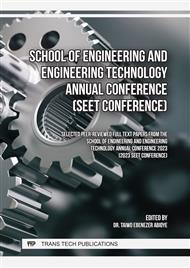[1]
Fadugba, O. G., Yusoff, M. S., Arogundade, S., Adam, N.H.,. Wang, L. K., and Wang, M. Z., (2022). Sustainable Solid Waste Management, L. K. Wang et al. (eds.), Solid Waste Engineering and Management, Handbookof Environmental Engineering 24
DOI: 10.1007/978-3-030-89336-1_1
Google Scholar
[2]
Nzeadibe, C. (2009). Solid waste reforms and informal recycling in Enugu urban area, Nigeria. Habitat International, 33, 93-99
DOI: 10.1016/j.habitatint.2008.05.006
Google Scholar
[3]
Oyeniyi, B. (2011). Waste Management in Contemporary Nigeria: The Abuja Example. International Journal of Politics and Good Governance, 2, 1-18.
Google Scholar
[4]
Sha'Ato, R., Aboho, S. Y., Oketunde, F., Eneji, I., Unazi, G., and Agwa, S. (2007). Survey of solid waste generation and composition in a rapidly growing urban area in Central Nigeria. Waste management (New York, N.Y.), 27, 352-358.
DOI: 10.1016/j.wasman.2006.02.008
Google Scholar
[5]
Nnaji, C. (2015). The Status Of Municipal Solid Waste Generation And Disposal In Nigeria. Management of Environmental Quality An International Journal, 26.
DOI: 10.1108/MEQ-08-2013-0092
Google Scholar
[6]
Nzeadibe, C., and Ejike-Alieji, A. (2020). Solid waste management during Covid-19 pandemic: policy gaps and prospects for inclusive waste governance in Nigeria.
DOI: 10.1080/13549839.2020.1782357
Google Scholar
[7]
Ikpeze, N. (2014). Safe Disposal of Municipal Wastes in Nigeria: Perspectives on a Rights Based Approach. Afe Babalola University: Journal of Sustainable Development Law And Policy, 3, 72-86.
Google Scholar
[8]
Aluko, O., Sridhar, M. K. C., and Oluwande, P. A. (2003). Characterization of leachates from a municipal solid waste landfill site in Ibadan, Nigeria. Journal of Environmental Health Research, UK, JEHR, 32-37.
Google Scholar
[9]
Boateng, T., Opoku, F., and Akoto, O. (2019). Heavy metal contamination assessment of groundwater quality: a case study of Oti landfill site, Kumasi. Applied Water Science, 9
DOI: 10.1007/s13201-019-0915-y
Google Scholar
[10]
Yadav, V., and Karmakar, S. (2019). Sustainable collection and transportation of municipal solid waste in urban centers. Sustainable Cities and Society, 53, 101937
DOI: 10.1016/j.scs.2019.101937
Google Scholar
[11]
Adeniran, A. E., Nubi, A., and Adelopo, A. (2017). Solid waste generation and characterization in the University of Lagos for a sustainable waste management. Waste management (New York, N.Y.), 67
DOI: 10.1016/j.wasman.2017.05.002
Google Scholar
[12]
Opoko, A. and Oluwatayo, A. (2016). Private sector participation in domestic waste management in informal settlements in Lagos, Nigeria. Waste Management and Research, 34
DOI: 10.1177/0734242X16666943
Google Scholar
[13]
TVC. (2020). LAWMA trains PSP operators. Retrieved from https://www.youtube.com/watch? v=o3ug4tU3dro:
Google Scholar
[14]
Kofoworola, O. F. (2007). Recovery and recycling practices in municipal solid waste management in Lagos, Nigeria. Waste management (New York, N.Y.), 27, 1139-1143.
DOI: 10.1016/j.wasman.2006.05.006
Google Scholar
[15]
Afon, A. (2007). Informal sector initiative in the primary sub-system of urban solid waste management in Lagos, Nigeria. Habitat International - HABITAT INT, 31, 193-204.
DOI: 10.1016/j.habitatint.2007.02.007
Google Scholar
[16]
Odewumi, O. (2013). Appraisal of Storage and Collection Strategies of Municipal Solid Waste in Lagos State. IOSR Journal of Humanities and Social Science, 10, 61-67
DOI: 10.9790/0837-1056167
Google Scholar
[17]
Aliu, I. R., Adeyemi, O. E., and Adebayo, A. (2014). Municipal household solid waste collection strategies in an African megacity: Analysis of public private partnership performance in Lagos. Waste Management and Research, 32(9_suppl), 67-78
DOI: 10.1177/0734242x14544354
Google Scholar
[18]
Awodele, O., Adewoye, A., and Oparah, A. (2016). Assessment of medical waste management in seven hospitals in Lagos, Nigeria. BMC Public Health, 16
DOI: 10.1186/s12889-016-2916-1
Google Scholar
[19]
Pulse.ng. (2019). Sanwo-Olu distributes 2m waste bags, 250,000 garbage bins to residents.
Google Scholar
[20]
Imam, A., Mohammed, B., Wilson, D., and Cheeseman, C. R. (2008). Solid waste management in Abuja, Nigeria. Waste management (New York, N.Y.), 28, 468-472
DOI: 10.1016/j.wasman.2007.01.006
Google Scholar
[21]
Kadafa, A. A. (2017). Solid Waste Management Practice of Residents in Abuja Municipalities (Nigeria). IOSR Journal of Environmental Science, Toxicology and Food Technology, 11, 87-106
DOI: 10.9790/2402-11020187106
Google Scholar
[22]
Adama, O. (2012). Urban governance and spatial inequality in service delivery: A case study of solid waste management in Abuja, Nigeria. Waste Manag Res, 30, 991-998
DOI: 10.1177/0734242X12454694
Google Scholar
[23]
Kadafa, A. A., Manaf, L., Sabrina, A., and Azmin, S. (2013). Current Status of Municipal Solid Waste Management Practise in FCT Abuja. Research Journal of Environmental and Earth Sciences, 5, 295-304
DOI: 10.19026/rjees.5.5704
Google Scholar
[24]
AEPB. (2018). AEPB GETS NEW BOARD. Retrieved from http://aepb.fcta.gov.ng/2018/08/15/aepb-gets-new-board/
Google Scholar
[25]
Agbaeze, E. K., Ofobruku, S. A., and Chukwu, B. I. (2020). Influence of Entrepreneurial Innovation on Sustainable Solid: Waste Recycling in Abuja, Nigeria. Periodica Polytechnica Social and Management Sciences
DOI: 10.3311/PPso.12626
Google Scholar
[26]
Igibah, E. C., Agashua, L., and Sadiq, A. (2019). Impact of controlling wastes and sustainable improvement in Bwari – Abuja, Nigeria. Journal of Physics: Conference Series, 1378, 042013
DOI: 10.1088/1742-6596/1378/4/042013
Google Scholar


